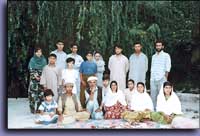Dusharin: "So Ali Madat was not a born-Pakistani. He has a Hunza background. Those
are highlanders and farmers who live in Karakorum
region (it's a two days' distance from Nanga Parbat). Ali Madat invited us to visit
him after the accent. He had been
working as a chef in a restaurant for more than 20 years. So, he was able to build houses
one in Gilgit and another one in Hunza (it's where he was born and he went there after he
left the restaurant in Gilgit having retired). He has a house in Gilgit where the families
of his two sons live. |

Hunza. Ali Madat's family
|
|
What amazed us in Hunza and in the family of Ali Madat were people's relationships. There
are 32 people in his family (his brother, the children and grandchildren). Everyone knows
his job. These people are very friendly. They respect each other. It is normal for younger
people to obey the adults. Nobody gives orders there. If the wife of Ali Madat wants
someone to do something, nobody argues but does the thing. And the way they treat each
other is just amazing. |
We stopped at Ali Madat. He has 3 houses which are situated on three levels of the
mountain slope. These houses are large and well equipped. There the standard of life is
higher than in other places of Muslims. There the way of life is similar to the way
Europeans live. In the house and in the backyard everything is very neat and accurate.
Maybe it's because Ali Madat is the head. He traveled a lot. He's been to the US and to
Islamabad. He became more experienced. For such a far away village the bathroom is well
equipped, there is an antenna on the roof, there are TV sets in every house.
The father of Ali Madat is still alive. He has the family of 185. Ali Madat is 68 and he
is one of the younger sons, and his father is 110 (he can barely move and he needs help to
do that ). There was one thing I couldn't understand. They made him a bed at the edge of
two terraces that surrounded the house. Why did they put him in such a noisy and crowded
place? He lies at the terrace and he can see things going on. If someone walks by (a
child, a youngster or an adult ), he could ask anything. Everything will be done for him.
Only then I understood the whole meaning of that. He is the head of the family and he is
to take the most respected place where everyone can observe him.
The son of Ali Madat, Hamid, says that they have neither poor nor rich people in the
village. Five percent are a little richer and the other 5% are poorer than they are. The
most live at the same social level. So, the have a kind of "mountain communism".
And that fact is really amusing.
It is clear that they had to work a lot to get all those things. People are hardworking.
The village is situated on the bare mountain slope. You can't grow much up there, but they
created fields at that slope. They made up huge stone walls (up to 20 meters high). A
space between a wall and a slope is usually filled by stones to make it flat. Then they
take soil and silt it up there. This is the way they make fields.
When you look at the terraces you just can't believe that they were made by people. Just
by people's hands and without anything else. Hamid said that the two fields (5 or 8 meters
to 30 meters) were made by the grandfather. And the other two were made by Ali Madat and
his wife. The next generations will also be making fields. Each generation captures a
piece of land from the mountain. That is that allows them to live. They manage to collect
a harvest twice a year. They sow wheat, corn, and potatoes. The gardens they have are just
wonderful. They even grow pomegranates. Hunza looks like a little bit of paradise on
earth.
We've been to Diamarey and Bunardas. Those are Muslim settlements. Weather conditions are
absolutely the same, but people there are starving and faint despite that. Hunza people
don't have anything like that. They are frank and very friendly. They always smile. It is
an unbelievable difference. Why is it like that? Everything is explainable. Islam took
over things people do. People spend a lot of time praying instead of working and improving
their life. Everything is different here. It is amazing how people organize their life and
work. People don't grumble but work. They rely on themselves. In this region people try to
use every single piece of land that is adjustable for growing things, and for
pastures."
| |
|
